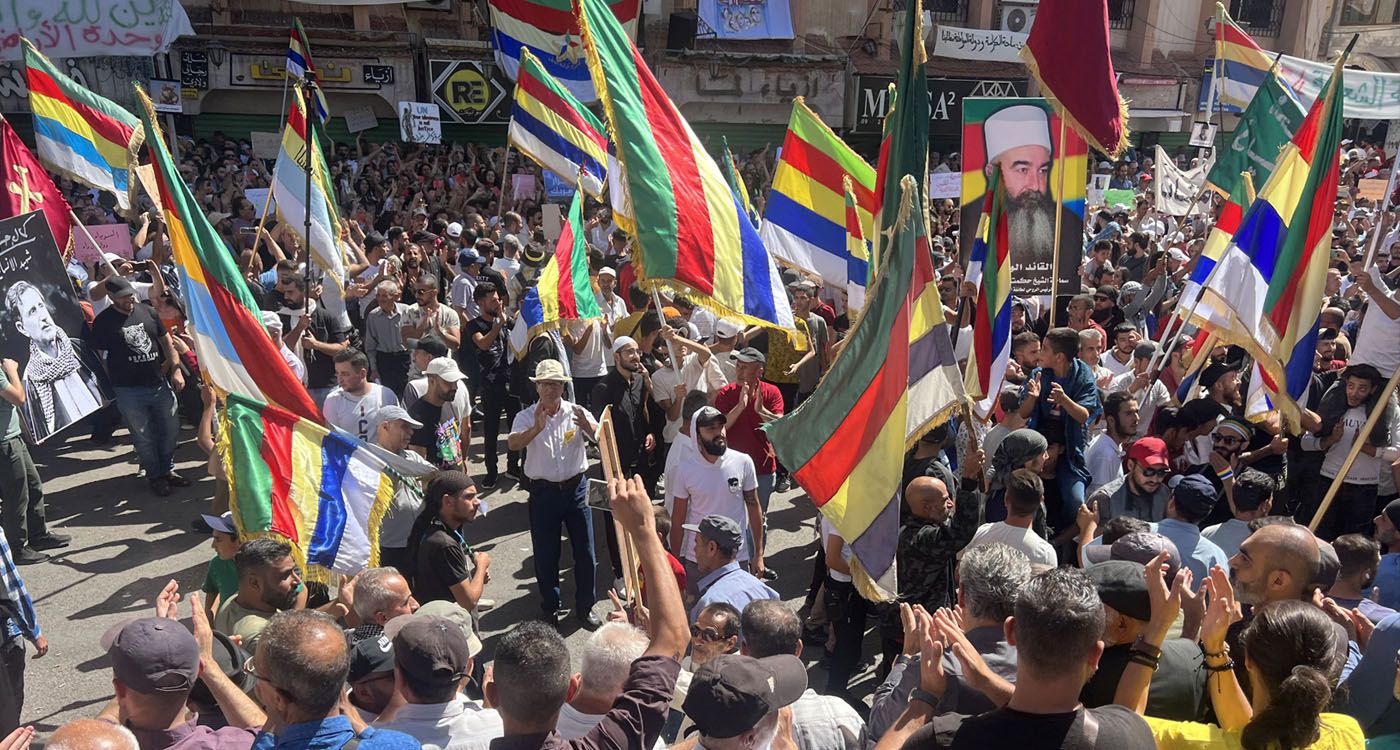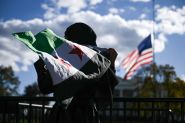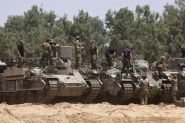- Home
- Middle East
- Joy and Apprehension Among Syria’s Druze Community

Peaceful demonstration against the Syrian regime in Sweida, 29 September 2023. ©Sam Hariri / AFP
Like everywhere else in Syria, the ouster of Syrian President Bashar al-Assad’s totalitarian regime was acclaimed with joy and celebrations in the predominantly Druze southern province of Sweida.
While they have historically been close to the regime, the esoteric minority Druze community, making up some 3 to 4% of Syria’s predominantly Sunni population of 25 million, largely stayed on the sidelines of the civil war that started in 2011 as an anti-government uprising that spiraled into a devastating strife.
Aside from defending themselves from attacks in the areas where they live, Syria's Druze had, until August 2023, strived to remain neutral. Since then and until Assad’s overthrow on December 8, Sweida was a focal point of renewed anti-government demonstrations. This movement, twelve years after the uprising, caused astonishment, especially coming from the Druze community.
“Most of Sweida’s residents have been living in utmost poverty. The province has been discriminated against and marginalized for decades, lacking basic services,” said Mahmoud, 54, a Druze from Sweida, in an interview with This is Beirut.
Since December 8, Mahmoud noted, the ousted government's security forces are nowhere to be seen in Sweida, and the office of Assad's Baath party has been abandoned. No member of Hay’at Tahrir al-Sham (HTS), the Islamist group which spearheaded the rebel offensive against Assad, has entered the province, which is now placed under the control of local armed groups.
“The local groups, which came into being after the outbreak of the civil war, are being regrouped under one command,” said Mahmoud, using a pseudonym. “A military council grouping retired Druze army officers and deserters has been established to manage security in the province under the supervision of Sheikh al-Akel (highest Druze religious authority) Hikmat al-Hajari.”
“Senior Druze clerics who were on the regime’s side have also paid allegiance to Sheikh al-Hajari,” he explained, adding that Druze members of the Baath party and those who held senior state positions were isolated, some even fleeing Sweida.
Much like the majority of Syrians, the Druze have suffered at the hands of Assad’s regime. Some of them lost family members during the anti-government uprising, while others languished in prison for decades or are still missing, feared dead.
Despite the overwhelming joy that swept the Druze province following Assad’s fall, concerns about an uncertain future persist.
“There is a general feeling of uneasiness and anxiety about what is coming next or what might happen, despite assurances made by the HTS of protecting minorities. After all, HTS represents a Salafi movement. They have different traditions and the Druze have their own customs; they don’t fast, they don’t go on pilgrimage to Mecca, and they have their own places of worship,” Mahmoud said.
He revealed that a meeting took place two days ago in Damascus between a delegation from Sweida’s Druze and HTS leader Abu Mohammad al-Joulani, who now goes by his real name, Ahmed al-Sharaa. “It was a positive and reassuring encounter as Sharaa stressed the importance of preserving Syria’s national unity and social fabric. But this is nice talk, and we need to see tangible action.”
In the days since taking Damascus, Sharaa, who was groomed by al-Qaeda and served with the Islamic State (ISIS), has been projecting the image of a moderate political Islamist and a champion of pluralism and tolerance, calling on his fighters to protect state institutions and avoid harming civilians.
However, Druze apprehension of Sunni Salafists is even more pronounced in four Druze villages located in the UN-monitored zone of the Golan Heights, which was invaded by Israeli troops in recent days to prevent the Islamists from deploying in the area.
In a statement, the inhabitants of Hader and other towns on the Israeli border called for Israel to annex the area like it did the Golan Heights.
“On behalf of all in Hader, if we must choose, we choose the lesser evil. We want to be annexed to the Israeli Golan to preserve our dignity,” the statement said.
In Beirut, an extraordinary meeting of the General Assembly of the Druze Sectarian Council was held on Tuesday to discuss the developments in Syria, in an obvious show of solidarity with their coreligionists.
Brushing aside fears of a Salafist rule, Druze leader and former chief of the Progressive Socialist Party, Walid Joumblatt, hailed “the victory” of the Syrian people, indicating that the Druze can only deal positively with the new Syrian leadership.
Read more




Comments